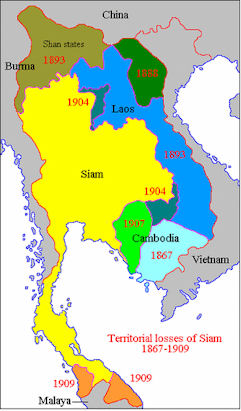

Zitierweise / cite as:
Payer, Alois <1944 - >: Chronik Thailands = กาลานุกรมสยามประเทศไทย. -- Chronik B. E. 2458 / 1915-04 - 1916-03 (Rama VI.). -- Fassung vom 2017-02-10. -- URL: http://www.payer.de/thailandchronik/chronik1915-16.htm
Erstmals publiziert: 2013-10-13
Überarbeitungen: 2017-02-10 [Ergänzungen] ; 2017-01-12 [Ergänzungen] ; 2016-12-03 [Ergänzungen] ; 2016-11-03 [Ergänzungen] ; 2016-10-28 [Ergänzungen] ; 2016-05-31 [Ergänzungen] ; 2016-02-25 [Ergänzungen] ; 2015-12-01 [Ergänzungen] ; 2015-10-22 [Ergänzungen] ; 2015-09-14 [Ergänzungen] ; 2015-09-02 [Ergänzungen] ; 2015-06-12 [Ergänzungen] ; 2015-04-27 [Ergänzungen] ; 22015-04-03 [Ergänzungen] ; 015-03-04 [Ergänzungen] ; 2014-11-26 [Ergänzungen] ; 2014-11-07 [Ergänzungen] ; 014-10-23 [Ergänzungen] ; 2014-08-24 [Ergänzungen] ; 2014-03-06 [Ergänzungen] ; 2014-01-14 [Ergänzungen] ; 2013-11-29 [Ergänzungen] ; 2013-11-23 [Ergänzungen]
©opyright: Dieser Text steht der Allgemeinheit zur Verfügung. Eine Verwertung in Publikationen, die über übliche Zitate hinausgeht, bedarf der ausdrücklichen Genehmigung des Herausgebers.
Dieser Text ist Teil der Abteilung
Thailand von
Tüpfli's Global Village Library
ช้างตายทั้งตัวเอาใบบัวปิดไม่มิด
|
Gewidmet meiner lieben Frau Margarete Payer die seit unserem ersten Besuch in Thailand 1974 mit mir die Liebe zu den und die Sorge um die Bewohner Thailands teilt. |
|
Bei thailändischen Statistiken muss man mit allen Fehlerquellen rechnen, die in folgendem Werk beschrieben sind:
Die Statistikdiagramme geben also meistens eher qualitative als korrekte quantitative Beziehungen wieder.
|
Statistische Daten 1915:
|
1915
Abb.: Seidenweberei, Nakhon Phanom, 1915
Abb.: Lage von Nakhon Phanom (นครพนม)
[Bildquelle: CIA. -- Public domain]
1915
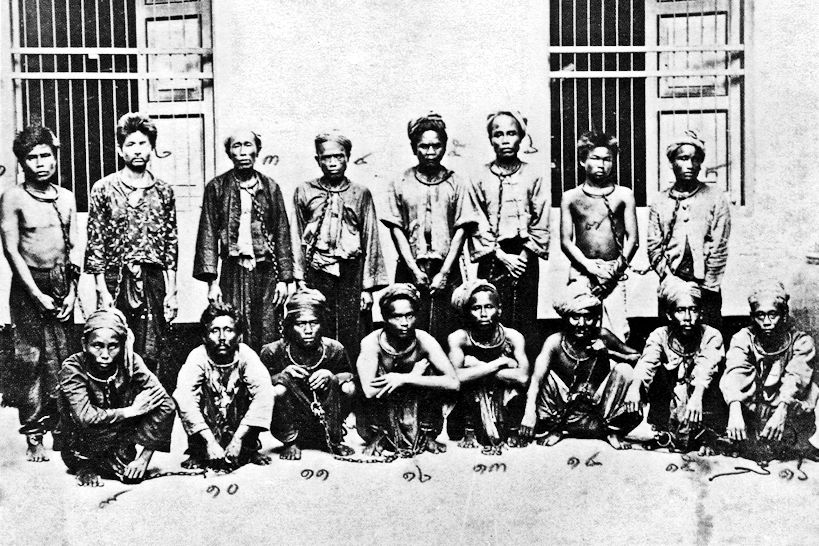
Abb.: Strafgefangene, Lampang (ลำปาง),
1915
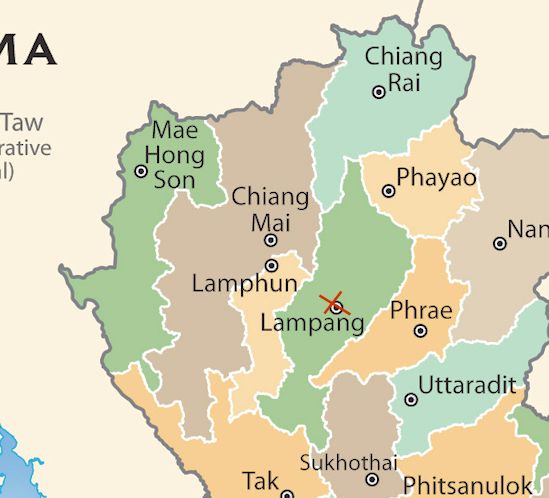
Abb.: Lage von Lampang (ลำปาง)
[Bildquelle: CIA. -- Public domain]
1915
Abb.: Weibliche Strafgefangene, Chiang Mai (เชียงใหม่), 1915
1915
Abb.: Familie, Chiang Mai (เชียงใหม่), 1915
1915
Abb.: Chiang Rai (เชียงราย), 1915
Abb.: Tai Nüa (ᥖᥭᥰᥖᥬᥳᥑᥨᥒᥰ / ไทเหนือ), Chiang Rai (เชียงราย), 1915
Abb.: Lage von Chiang Rai (เชียงราย)
[Bildquelle: CIA. -- Public domain]
1915
Abb.: Straßenverkehr, Bangkok, 1915
1915

Abb.: Schülerinnen des Kullasatri Wanglang (กุลสตรีวังหลัง) (heute: Wattana Wittaya Academy - โรงเรียนวัฒนาวิทยาลัย) mit ausländischer Lehrerin, 1915
1915/1916
Aus Thap Thiang (ทับเที่ยง) / Trang (ตรัง)
"That year we had extraordinarily heavy rains and flooding - the water rising higher than it had in 20 to 30 years, with bridges washed out and some track as well. Some people experienced real distress as walls caved in. Some of the houses near the river were entirely under water, and people were living on boards placed across rafters just under the roof. The mold that came with the rain really troubled us. Soiled clothes were mildewed before you knew it, and an occasional centipede found within them. Even our new books were powdery with mold. Con had to wait for a warm dry day, to dry them out thoroughly and varnish them. Shoes left for a few days needed to have the mold wiped from the inside and the outside." [Quelle: Stanton, Mary Bulkley <1922 - > ; Bulkley, Edna Bruner <1883 - 1962>: Siam was our home : a narrative memoir of Edna Bruner Bulkley's years in Thailand in the 1900s, with added memories from her children. -- Seattle, WA : Hara, 2003. -- 345 S. : Ill. ; 23 cm. -- ISBN 1-887542-14-0. -- S. 194. -- Faire use]
1886 - 1921
Entwicklung des staatlichen Schulwesens:
Abb.: Anzahl der staatlichen Schulen 1886 - 1921
[Datenquelle: Manich Jumsai [มานิจ ชุมสาย] <1908 - 2009>: Compulsory education in Thailand. -- Paris : UNESCO, 1951. -- 110 S. ; 22 cm. -- (Studies in compulsory education ; VIII). -- S. 30]
Abb.: Anzahl der Lehrer an staatlichen Schulen 1886 - 1921
[Datenquelle: Manich Jumsai [มานิจ ชุมสาย] <1908 - 2009>: Compulsory education in Thailand. -- Paris : UNESCO, 1951. -- 110 S. ; 22 cm. -- (Studies in compulsory education ; VIII). -- S. 30]
Abb.: Anzahl der Schüler an staatlichen Schulen 1886 - 1921 (in Tausend)
[Datenquelle: Manich Jumsai [มานิจ ชุมสาย] <1908 - 2009>: Compulsory education in Thailand. -- Paris : UNESCO, 1951. -- 110 S. ; 22 cm. -- (Studies in compulsory education ; VIII). -- S. 30]
1910 - 1950
Durch Naturgewalten zerstörte landwirtschaftliche Fläche in Prozent der kultivierten Gesamtfläche (Fünfjahresmittel: verdecken die starken jährlichen Schwankungen):
Abb.: Durch Naturgewalten zerstörte kultivierte Fläche (Fünfjahresmittel, verdecken starke jährliche Schwankungen), 1910 - 1950
[Datenquelle: Ingram (1971), S. 201]s
1915 - 1926
Chaophraya Thammasakmontri (Sanan Devahastin na Ayutthaya) [เจ้าพระยาธรรมศักดิ์มนตรี (สนั่น เทพหัสดิน ณ อยุธยา), 1876 - 1943] ist Unterrichtsminister. Er führt 1921 die allgemeine Schulpflicht ein.
Abb.: Chaophraya Thammasakmontri (Sanan Devahastin na Ayutthaya) [เจ้าพระยาธรรมศักดิ์มนตรี (สนั่น เทพหัสดิน ณ อยุธยา), 1876 - 1943] / Zeichnung von Rama VI.
[Bildquelle: th.Wikipedia. -- Public domain]
1915
Wichtigste Beamte eines Monthon (มณฑล):
- Monthon commissioner
- Monthon deputy commissioner
- Monthon prosecutor
- Monthon penitentiary officer
- Monthon police commander
- Monthon public health officer
- Monthon military assistant commissioner
- Monthon agricultural officer
- Monthon treasury officer
- Monthon revenue officer
- Monthon customs officer
- Monthon inspector of post and telegraph service
- Monthon educational officer
1915
Die Armee hat 30.000 aktive Militärs.
1915
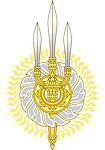
Rama VI. besucht zwei Monate lang Südthailand.
1915

Der buddhistische Herrscher Rama VI. über den Segen des Krieges:
"Where there has been a long period of peace, people have had time to think of the pursuit of pleasure and the gratification of self, so that they have grown selfish; their outlook on life and things in general have become narrower and narrower, until nothing becomes so important to them as their own selves. In a way, I agree with some of the German writers who say that war is actually a blessing in disguise, because war compels one to think of something bigger and greater than one's own self. War certainly rouses people from that dream of self- interest, from which it is extremely difficult to wake, except with the thunder of guns or the points of bayonets." [Übersetzt in: Vella, Walter F. <1924 - 1980>: Chayo! : King Vajiravudh and the development of Thai nationalism / Walter F. Vella, assisted by Dorothy B. Vella. -- Honolulu : Univ. Press, 1978. -- 347 S. : Ill. ; 25 cm. -- ISBN 0-8248-0493-7. -- S. 113.]
1915

Es erscheint Ramas VI. Abhandlung über den ökonomischen Nationalismus:
วชิราวุธ: เมืองไทยจงตื่นเถิด. -- o. O. : โรงพิมพ์โสภณพิพรรฒธนากร, o. J. -- [Thailand wach auf!]
Abb.: Einbandtitel einer Neuausgabe
"The essay started with a definition of the problem. At one time, Vajiravudh wrote, the Thai people produced the articles they needed. With the advent of peace and prosperity, the expansion of foreign trade, and the immigration of Chinese laborers, the Thai came to rely excessively on foreigners. Foreign imports drove Thai manufacturers out of the market. Cheap foreign labor replaced Thai workmen in many crafts and industries. The Thai accepted the new emergent economy because it was convenient. The Thai, who "by nature do not like to work hard," were content to leave manual labor to the Chinese. The Thai became lazy, giving up skills they once had, depending on foreigners for products they once made. Locally, the Chinese took over food marketing in Bangkok; they dominated the construction industry and carpentry trades. The international market supplied machinery, petroleum, benzine, coal, sugar, and cloth. Some of these imports were necessary, but not all. Petroleum for lamps could be replaced by locally produced coconut oil. Homegrown castor oil could easily supplant imported lubricating oil. Siam had once been self-sufficient in sugar and cloth and could again be. The disadvantages in economic dependence were apparent ' enough in peacetime; they would expand manyfold in wartime and make Siam extremely vulnerable." [Quelle: Vella, Walter F. <1924 - 1980>: Chayo! : King Vajiravudh and the development of Thai nationalism / Walter F. Vella, assisted by Dorothy B. Vella. -- Honolulu : Univ. Press, 1978. -- 347 S. : Ill. ; 25 cm. -- ISBN 0-8248-0493-7. -- S. 172 f.]
"A man who does not know how to preserve his nation [ชาติ] cannot be a man." [Übersetzt in: Vella, Walter F. <1924 - 1980>: Chayo! : King Vajiravudh and the development of Thai nationalism / Walter F. Vella, assisted by Dorothy B. Vella. -- Honolulu : Univ. Press, 1978. -- 347 S. : Ill. ; 25 cm. -- ISBN 0-8248-0493-7. -- S. 178]
"The Thai nation must know what constituted a nation; it must also know what constituted its "Thainess." In the King's words: "We must remember that we Thai have characteristics basically different from those of foreigners." What set the Thai nation apart? A combination of things including
- Thai history,
- Thai art,
- Thai language,
- Thai literature,
- Thai Buddhism,
- Thai love of the royal leader,
- and an essential Thai spirit, a fierce devotion to thai in the sense of "free," a warrior spirit that the King frequently called the Wild Tiger spirit.
It was vital that all of these characteristics of the Thai be preserved. That, indeed, they be built upon and strengthened."
[Quelle: Vella, Walter F. <1924 - 1980>: Chayo! : King Vajiravudh and the development of Thai nationalism / Walter F. Vella, assisted by Dorothy B. Vella. -- Honolulu : Univ. Press, 1978. -- 347 S. : Ill. ; 25 cm. -- ISBN 0-8248-0493-7. -- S. 178]
"I do not ask you to hate the Chinese; I ask only that you think more of yourselves. You who are Thai must do more for your own nationality than you do for the Chinese. Whenever you must choose between what is of benefit to the Chinese or to the Thai, there should be no question, you should choose the Thai. That is my only wish." [a.a.O., S. 13. -- Übersetzt in: Vella, Walter F. <1924 - 1980>: Chayo! : King Vajiravudh and the development of Thai nationalism / Walter F. Vella, assisted by Dorothy B. Vella. -- Honolulu : Univ. Press, 1978. -- 347 S. : Ill. ; 25 cm. -- ISBN 0-8248-0493-7. -- S. 195]
1915
Es erscheint
ดำรงราชานุภาพ <สมเด็จพระเจ้าบรมวงศ์เธอ กรมพระยา> [Damrong Rajanubhab] <1862 - 1943>: สำหรับสอบศักราช ซึ่งมักพบในศิลาจารึกและหนังสือเก่าๆ ในเมืองไทย [Studie über die Zeitrechnungen in den Inschriften und alten Texten Thailands]. -- Bangkok : Thai Press, [1915]. -- 34 S.
"A comparative study of the calendrical systems used in early and modem Thai texts; includes charts for converting to the Buddhist Era year from the Chulasakarat Era years C.S. 566- 1285 (A.D. 1204-1923) and from the ten- and twelve-year cycles of year-names used in Lan Na [ล้านนา] and in the central and upper Mekong region." [Quelle: Breazeale, Kennon: The writings of Prince Damrong Rajanubhab : a chronology with annotations. -- Bangkok : Toyota Thailand Foundation : Foundation for the Promotion of Social Science and Humanities Textbooks Project, 2008. -- 60 S. ; 22 cm. -- ISBN 9789740697411. -- S. 24]
1915
Abb.: Chinesen, Nan (น่าน), 1915
Abb.: Lage von Nan (น่าน)
[Bildquelle: CIA. -- Public domain]
1915

Uma Shankar Chaubey, Sunder Dass Pawa und Ram Deo Ojha gründen in Bangkok die Hindu Dharma Sabha.
1915
Alkoholgenuss nimmt zu.
1915 - 1919

Herbert Dering (1867 - 1933) ist britischer Envoy Extraordinary and Minister Plenipotentiary
1915 - 1917

US-Prof Wolcott Homer Pitkin (1881 - ) ist außenpolitischer Berater der Regierung.
1915
Comics Pleng Treipin (เปล่ง ไตรปิ่น).
Abb.: Footbol (ฟุตบอล) in: Comics Pleng Treipin (เปล่ง ไตรปิ่น), 1915
[Bildquelle: th.Wikipedia. -- Public domain]
1915
Es erscheinen
50 Zigaretten-Bilder mit Darstellung siamesischer Militäruniformen, hergestellt von der British American Tobacco Plc (BAT) für Siam.
Abb.: Beispiel
1915

Fertigstellung des Sra Pathum Palasts (วังสระปทุม) in Bangkok.
Abb.: Lage des Sra Pathum Palasts (วังสระปทุม)
[Bildquelle: OpenStreetMap. -- Creative Commons Lizenz (Namensnennung, share alike)]
Abb.: Sra Pathum Palast (วังสระปทุม), Bangkok
[Bildquelle: ©Google earth. -- Zugriff am 2012-03-28]
"Der Sra-Pathum-Palast (Thai: วังสระปทุม - Wang Sa Pathum, etwa „Lotusweiher-Palast“) ist eine Palastanlage in Bangkok, der Hauptstadt von Thailand. Er ist zugleich die Residenz von Prinzessin Maha Chakri Sirindhorn (มหาจักรีสิรินธร, 1955 - ) in der thailändischen Hauptstadt. Lage
Der Sra-Pathum-Palast liegt im Bezirk (Khet) Pathumwan (ปทุมวัน), Bangkok. Er wird im Osten begrenzt von der Thanon Phaya Thai (Phaya-Thai-Straße), im Norden von Khlong Saen Saeb (คลองแสนแสบ), im Westen vom Gelände des Wat Pathum Wanaram (วัดปทุมวนาราม) und im Süden von der Thanon Rama 1 (Rama-I.-Straße).
Der südliche Teil des Palastgeländes ist an Investoren verpachtet, dort befinden sich heute mehrere moderne Einkaufszentren, zum Beispiel das Siam Center, das Siam Discovery Center und das Siam Paragon.
Geschichte Tamnak YaiDer „Tamnak Yai“ (Thai: พระตำหนักใหญ่ - Große Villa) wurde Anfang des 20. Jahrhunderts von dem italienischen Architekten Mario Tamagno (1877 - 1941) entworfen und im Jahr 1915 fertiggestellt. [1]
Seit der Regierungszeit von König Vajiravudh (Rama VI.) bis zu ihrem Tod am 17. Dezember 1955 lebte Königin Savang Vadhana (สมเด็จพระศรีสวรินทิราบรมราชเทวี, 1862 - 1955) 39 Jahre lang in dieser Villa. Mit ihr wohnten hier ihr jüngster Sohn, Prinz Mahidol Adulyadej (สมเด็จฯ เจ้าฟ้ามหิดลอดุลยเดช กรมหลวงสงขลานครินทร, 1892 - 1929) mit dessen Ehefrau Srinagarindra (ศรีนครินทรา, 1900 - 1995) und drei königliche Enkel. Savang Vadhana veranlasste außerdem, dass am 28. April 1950 der derzeitige König von Thailand Bhumibol Adulyadej seine Königin Sirikit im Tamnak Yai heiratete.
1997 wurde das Gebäude aus Anlass des 80. Geburtstags von König Bhumibol renoviert und kurz vor dem Tod von Prinzessin Galyani Vadhana (กัลยาณิวัฒนา, 1923 - 2008), die ebenfalls zwei Jahre hier lebte, fertiggestellt.
NutzungAm 17. Dezember 2008 wurde im Tamnak Yai das „Queen Savang Vadhana Museum“ (พิพิธภัณฑ์สมเด็จพระพันวัสสาอัยยิกาเจ้า) eröffnet, die im Sra-Pathum-Palast die letzten Jahrzehnte ihres Lebens verbrachte. Die Eröffnungszeremonie stand unter dem Vorsitz von Prinzessin Maha Chakri Sirindhorn. [2]
[Quelle: http://de.wikipedia.org/wiki/Sra-Pathum-Palast. -- Zugriff am 2012-03-28]
1915-Ende

Heftige Regenfälle beschädigen 500 Kilometer der Südbahnstrecke, 10 Kilometer werden völlig weggerissen. Fehlplanung der britischen Firma unter Henry Gittins (1858 - 1937).
1915
Tod des Sozialkritikers Thianwan (เทียนวรรณ aka. T. W. S. Wannapho - ต.ว.ส. วัณณาโภ, 1842 - 1915). Er war ein Bürgerlicher, wurde 1882 lebenslänglich verurteilt, nach 16 Jahren entlassen. Er schrieb gegen Zwangsarbeit (Fronarbeit), Polygamie, die Unterstützung von Glücksspielen durch die Regierung, mangelnde Volksvertretung und vor allem dagegen, dass Politik das Privileg des Hochadels ist. Er trat für Fortschritt ein.
Abb.: Thianwan (เทียนวรรณ aka. T. W. S. Wannapho - ต.ว.ส. วัณณาโภ)
[Fair use]
1915
Abb.: Fahrradbesitzer, Bangkok, 1915
1915
Es erscheint der Roman
ครูเหลียม [= ครูเหลียม วินทุพราหมณกุล = นายสำราญ] [Khru Liam=Nai Samran] <1879 - 1963>: ความไม่พยาบาท [No vendetta]
Es ist vermutlich der erste Thai-Roman
Abb.: Khru Liam (ครูเหลียม)
Abb.: Einbandtitel einer Neuausgabe1921 erhält Khru Liam den Titel หลวงวิลาศปริวัตร (Luang Wilat Pariwat - Sir Guter Übersetzer)
1915


Es erscheint
Cartwright, B. O. (Basil Osborn) <1877 - 1928>: The student's manual of the Siamese language. -- Bangkok : American Presbyterian Mission Press, 1915. -- 320 S. ; 19 cm.
Abb.: Titelblatt
"Appendix H. COURT SIAMESE.
Like most Eastern languages, Siamese has a special form which is used when speaking about or to persons of royal origin. It is not necessary for Europeans to learn to speak the Court Siamese, for the reason that now-a-days, all Siamese princes can speak some European language (English as a rule). Still the student of the Siamese language should know something about Court Siamese, as it is always employed in Royal Proclamations, Official notices, Siamese history and in all other matters in which Royal personages are concerned. Most of the words which are peculiar to Court Siamese are derived more or less directly from the Pali or the Sanscrit, but of course, a large number of ordinary words and expressions are used as well. As a rule it is very easy to distinguish Court words from the corresponding ordinary words, as words which are nouns are always prefixed by the word พระ and words which are verbs are as a general rule prefixed by the word ทรง. There are, however, several common verbs which do not take the prefix ทรง, e. g. เสวย to eat, เสด็จ to go or to come.
Complete lists of the special Court words may be found in any of the vernacular text-books known as ราชาศัพท์ and hence it would be out of place to give detailed lists here.
The main classes of words which have a special court form are as follows.
- 1. All parts of the body, e. g. Foot, ordinary word เท้า, Court word พระบาท.
- 2. Common objects belonging to and used by royal persons, e. g. Clothes, common word เสื้อผ้า, Court word ฉลองพระองค์,
- 3. Articles of food and drink, e. g. Tea, common word น้ำชา, Court word พระสุธารศ์ร้อน.
- 4. Words expressing relationship, e. g. Father, common word พ่อ, Court word ชนก.
- 5. Most verbs of bodily action, e. g. to eat, common word กิน, Court word เสวย,
- 6. Names of certain animals, fish, fruit and flowers, e. g. buffalo, common word ควาย, Court word กระบือ.
In addition to the above there are certain phrases used in addressing and answering royal persons, H. M. the King especially."
[a.a.O., S. 235f.]
"Appendix J. NOTES ON SIAMESE NAMES AND TITLES.
Siamese birth names are usually given by the parents of the child, and there is no sex distinction in such names, the same name, e. g. แดง (red) may be applied with equal propriety to either a boy or a girl. Until quite recently, there were no names to correspond with European surnames, but in the present reign, surnames or family names have been given by the King to the majority of the members of the official classes. A Siamese may change his or her birth name as often as he or she pleases without any legal formality whatever.
Of the titles of address to ordinary people the following are commonly used,
- หนู to small children of either sex up to the age of about 10, but no hard and fast line is drawn.
- พ่อ to boys over 10, or to young men.
- ตา to old men.
- นาย to men generally.
- แม่ to women generally.
- อำแตง to women generally (legal term).
- ยาย to old women.
- คุณนาย to wives of officials.
- หม่อม to wives of princes.
- นาง servant girls, and ironically to other women.
- อ้าย to male slaves and convicts and as an insult.
- อึ to female slaves and convicts and as an insult.
All these terms are used in conjunction with the birth name of the person in question.
Siamese Titles fall into three divisions.
(A.) Royal titles which are hereditary to a limited extent.
The titles of Royal birth are as follows.
The children of the reigning King bear the titles of
- "Somdech Chao Fa" สมเด็จเจ้าฟ้า
- "Chao Fa" เจ้าฟ้า,
- "Phra Ong Chao" พระองค์เจ้า
according to whether their mother is
- A Royal Princess,
- A woman of the rank of "Mom Chao" หม่อมเจ้า,
- A woman not of royal birth,
but the title of "Somdech" สมเด็จ may be given by the King to a "Chao Fa" เจ้าฟ้า.
All of the above are entitled to the term "Royal Highness" and they may be promoted, when of age, to the title of "Krom" กรม of which there are five grades, viz.
- Krom Phya กรมพระยา,
- Krom Phra กรมพระ,
- Krom Luang กรมหลวง,
- Krom Khun กรม,
- Krom Mün กรมหมื่น
the first mentioned being the highest.
The Crown Prince bears the title of สมเด็จพระบรมโอรสาธิราช.
The children of all these princes bear the birth title of "Mom Chao" หม่อมเจ้า
which is officially rendered into English by the term "Serene Highness". Thus "Mom Chao" หม่อมเจ้า is the title of the grandchildren of the King. A "Mom Chao" may be raised to the rank of a "Phra Ong Chao" พระองค์เจ้าChildren whose father is a "Mom Chao" หม่อมเจ้า
have the title of "Mom Rachawongse"หม่อมราชวงศ์ and their offspring in turn are designated as "Mom Luang" หม่อมหลวง. The children of a "Mom Luang" are ordinary "Nai" นาย, i. e. commoners. Thus it may be seen that the royal descent automatically becomes extinct with the fifth generation from the King in the male line.Wives of the King have the title "Chao Chom" เจ้าจอม
but if they have had issue, they take the title of "Chao Chom Manda " เจ้าจอมมารดา. There are also special titles given to the chief or favourite wives.(B) Official Titles of Nobility given by the King.
These are not hereditary and may be revoked at the Royal will.
A commoner may be raised to the following titles of which the first is the lowest
- 1. "Pan" พัน,
- 2. "Mun" หมึ่น,
- 3. "Khun" ขุน,
- 4. "Luang" หลวง,
- 5. "Phra" พระ.
- 6. "Phya" พระยา,
- "Chao Phya" เจ้าพระยา
- 8. "Somdech Chao Phya" สมเด็จเจ้าพระยา
All persons possessing any of the above titles are collectively known as ขุนนาง Noblemen. The first two, however, are very rarely given and the last has been in abeyance for many years. These titles are somewhat like the European orders of knighthood, and therefore must on no account be translated by such words as Baron, Marquis, etc. as they are not hereditary; and also for the reason that many of them are titles appertaining to particular offices or official positions in the Government Service.
All native officials in the Government service receive in addition a titular grade corresponding to Army Rank as follows.
Military rank Corresponding Civilian grade Corporal or Sergeant นายสิย none Sergeant-Major จ่านายสิย ราชบุรุษ 2nd Lieut, นายร้อยตรี รองอำมาตร์ตรี 1st. Lieut นายร้อยโท รองอำมาตร์โท Captain นายร้อยเอก รองอำมาตร์เอก Major นายพันตรี อำมาตร์ตรี Lieut. Colonel นายพันโท อำมาตร์โท Colonel นายพันเอก อำมาตร์เอก Brig. General นายพลตรี มหาอำมาตร์ตรี Lieut. General นายพลโท มหาอำมาตร์โท General นายพลเอก มหาอำมาตร์เอก Field Marshal จอมพล none Note.—'The words เอก, โท, ตรี are the Pali for one, two, three respectively. The word มหาอำมาตร์ is officially rendered into English as "Grand Councillor" and อำมาตร์ as "Councillor". Officials of the Royal Household of the King have the title of เสวัก "Chamberlain" instead of อำมาตร์. Besides these, there are various ranks of Royal pages and attendants. Naval rank is similar to the Military but the words เรือ and นาวา are used instead of ร้อย and พัน respectively.
(C) Courtesy titles.
คุณ is a courtesy title given to the sons of noblemen. It is frequently applied by servants to the sons of their master who may not have any title at all; hence it is used somewhat like the English courtesy title of Esq. This word is also used as an honorific prefix to the names of elder relatives, e. g. คุณแม่ Mother, คุณพี่ Elder brother or sister.
Certain Siamese relationships are at first somewhat puzzling, as the terminology employed is more complex than that employed in western countries. The following terms should be noticed.
Fathers side Mothers side Grandfather ปู่ ตา Grandmother ย่า ยาย Elder brother ลุง ลุง Elder sister ป้า ป้า Younger brother or sister อา น้า [a.a.O., S. 259 - 263]
1915

Es erscheint das Prachtwerk:
Ravendro Ravi [= Karl Siegfried Döring] <1879 - 1941>: Kunst und Kunstgewerbe in Siam. -- Bangkok : Asia Publishing House, 1915. -- Einfache Ausgabe: Tafeln auf gelbem Karton, in braune Bourette-Seide gebunden : 126.- RM ; Luxusausgabe mit 2 Tafelbänden, Tafeln auf handaufgelegtes Blattgold gedruckt, in rote Bourette-Seide gebunden : 462.- RM.
1915
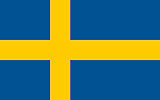
Es erscheint folgender Reisebericht. Darin beschreibt Prinz William von Schweden (1884 - 1965) u.a. seine Erlebnisse bei der Teilnahme an der Krönung Ramas VI.
William <Prince of Sweden> [= Wilhelm <Prins, hertig av Södermanland] <1884 - 1965>: In the lands of the sun : notes and memories of a tour in the East. -- London : Nash, 1915. -- 344 S. : Ill.
Darin die Übersetzung eines Gedichts von Kronprinz Vajiravudh, jetzt Rama VI.:
Love of our Race and our Fathers' Land heaven and earth pass away !Fre
e-bornmen,
Let us not forget our race and our faith;
Let us not have been born in vain Of a free nation.
How could a man who respects himself Remain idle?
Each one ought to work,
That all may be ready !In a country without love and union The best work cannot bear fruit;
And if a nation is breaking up and near its ruin,
How can the private individual hope for prosperity?
If foreigners should rule over us,
We should be slain and ill-treated;
They would oppress us from morning till night,
As is the way of conquerors.
Do not imagine that they would respect our position and name
Or that they would consider our birth;
We ourselves should suffer
And be put to shame before the rest of the world.Therefore, comrades, may we be loyal to the King
And true to our country and our faith:
May we offer our lives without regret
That the freedom of "the Free" be not lost !
Let us stand united,
And certain victory is ours!
Let us be brave and firmly determined
To protect our liberty till[a.a.O., S. 140}
Dieses Lied wurde zur Regierungszeit Ramas VI. oft gesungen.
1915
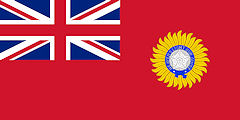
Es erscheint
Cochrane, Wilbur Willis: The Shans. -- Vol. I. -- Rangoon : Government Printing, 1915. -- 227 S. : Ill. ; 22 cm. -- Es erscheinen keine weiteren Bände.
Abb.: Titelblatt
1915, Ende


Rama VI. schickt Geld für die Kriegswitwen und -waisen der britischen Durham Light Infantry Company. Er hatte während seiner Studienzeit in Großbritannien bei dieser Kompanie gedient. Der König will damit britischem Verdacht entgegentreten, dass die Siamesen pro-deutsch seien.
1915

140.000 vietnamesische Söldner und Arbeiter werden nach Frankreich geschickt. Sie werden von skrupellosen Werbern mit Erpressung angeworben.
1915/1916
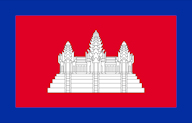
Kambodscha: "1916 Affair"
"Starting at the end of 1915 but growing quickly over the following two months, crowds of peasants made their way to Phnom Penh [ភ្នំពេញ] and to the Royal Palace to tell the king of their discontent with the taxes and labour demanded of them. At times the number of peasants massed in front of the palace was as many as ten thousand, and estimates of the total number of protesters were as high as one hundred thousand. On at least one occasion the crush of the crowd was so large that they broke through the palace gates, scattering the palace guards, to Sisowath’s [ព្រះបាទស៊ីសុវតិ្ថ, 1840 – 1927] considerable annoyance. During the entire period of the "affair" the peasants simply ignored the French. It was the king whom they came to see, and it was the king who, having listened to their complaints, promised to review the tax and corvée system, and sent the protesters on their way back to their villages. Throughout 1916 there was no violence in Phnom Penh. This was not the case in the provinces, where deaths did occur. Just how many deaths were a result of the demonstrations, whether on the part of the peasants or the forces of order, is one of the many uncertainties associated with the protests. The lowest number recorded was eight, but it is clear that there were more; something of the order of fifty seems more likely. As the French puzzled over the event, with some seeing it as part of a plot involving German espionage, one clear lesson emerged. The king in Phnom Penh remained the central figure in the kingdom for the Cambodian population. The French may have robbed him of his temporal power, but his symbolic importance was as strong as ever, perhaps even more so. Moreover, the paradox involved in this situation goes even deeper, for including the last king to reign before the institution of French control, Ang Duang [ព្រះបាទ អង្គ ឌួង, 1796 - 1860], no Cambodian monarch for centuries had exercised power other than with the assistance of other rulers. Yet now the Cambodian monarch rejoiced in greater symbolic riches in the eyes of his subject than had ever been the case since the abandonment of Angkor."
[Quelle: Osborne, Milton E. <1936 - >: Phnom Penh : a cultural history. -- New York : Oxford Univ. Pr., 2008. -- 232 S. : Ill. ; 22 cm. -- ISBN 9780195342482. -- S. 82f. -- Fair use]
1916


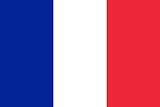
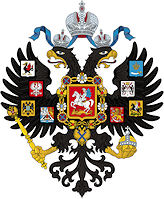
Rama VI. betont seine pro-alliierte Einstellung im Weltkrieg durch zahlreiche Teilnahme (und Spenden) an Veranstaltungen
- des britischen Roten Kreuzes
- des französischen Roten Kreuzes
- des russischen Roten Kreuzes
- des alliierten Roten Kreuzes
1915-04
Bang Sue [บางซื่อ]: Inbetriebnahme der Ersten Zementfabrik Siams
Abb.: Lage von Bang Sue [บางซื่อ]
[Bildquelle: OpenStreetMap. -- Creative Commons Lizenz (Namensnennung, share alike)]
1915-04

Die 1913 gegründete Rockefeller Foundation der USA beginnt mit der Unterstützung des siamesischen Gesundheitswesens: Dr. Victor Heiser (1873 - 1972) arbeitet an der Ausrottung der Hakenwurm-Befall (Ankylostomiasis): Hakenwurm ist sehr verbreitet in Nordthailand, besonders Chiang Mai (เชียงใหม่) und Nan (น่าน). Heiser und sein Team behandeln in Zusammenarbeit mit dem Siamesischen Roten Kreuz innerhalb eines Jahrs fast 350,000 Personen und lässt 83.000 Latrinen bauen. Das Programm lauft bis 1928.
Abb.: Lage von Chiang Mai (เชียงใหม่) und Nan (น่าน)
[Bildquelle: OpenStreetMap. -- Creative Commons Lizenz (Namensnennung, share alike)]
Abb.: Karte der Hakenwurm-Bekämpfung 1923
[Bildquelle: http://www.rockefellerfoundation.org/app/uploads/Innovative-Partners.pdf. -- Zugriff am 2015-04-27]
Abb.: Lebenszyklus des Hakenwurms
[Bildquelle: http://www.cdc.gov/parasites/hookworm/biology.html. -- Zugriff am 2013-11-17. -- Public domain]
1915-04-01
Gründung des Departement of Statistical Forecasting (กรมสถิติพยากรณ์), des ersten Statistischen Amts Siams.
1915-04-23 - 1915-04-28

Es erscheint:
Asvabahu [= Vajiravudh - วชิราวุธฯ] <1881 - 1925>: Clogs on our wheels. -- In: Siam Observer. -- 1915-04-28
Darin über "Clerkism":
"Any man with a grain of commonsense must surely understand that for a country like Siam, the agriculturist and cultivator is much more likely to contribute to her wealth than the clerk, who after all is as much an instrument as the pen or typewriter that he uses (or misuses). As a producer his value is very low in comparison to what he consumes. And yet the clerk thinks himself superior to the farmer, and the worst of it is that we others go on allowing him to think it too! When will our young men understand that it is quite as honourable to be a farmer, a cultivator, or an artisan, as it is to be a quill-driver?"
[Vajiravudh: Clogs on our wheels. -- S. 42f. -- Zitiert in: Vella, Walter F. <1924 - 1980>: Chayo! : King Vajiravudh and the development of Thai nationalism / Walter F. Vella, assisted by Dorothy B. Vella. -- Honolulu : Univ. Press, 1978. -- 347 S. : Ill. ; 25 cm. -- ISBN 0-8248-0493-7. -- S. 166.]
Darin über Journalisten
"Most of the better educated and most capable men of letters are employed in the government service, and have not time for anything but occasional contributions to journals. Those who do write regularly therefore are either men of very indifferent education or dismissed officials with mountains of grievances against the government. That is the reason why the tone of most Siamese journals has been distinctly against the government." [Zitiert in: Greene, Stephen Lyon Wakeman: Absolute dreams : Thai government under Rama VI, 1910-1925. -- Bangkok : White Lotus, 1999. -- 224 S. ; 22 cm. -- ISBN 974-8434-69-9. -- S. 72]
Darin über Ausländer (ฝรั่ง):
"The extraordinary esteem given Westerners had brought into being in Siam the "cult of imitation," which the King identified as "the biggest and worst clog" on the wheels of Siam's progress. The unreasoning imitation of Westerners had been carried by some to the ridiculous extremes of choosing Western woolen trousers over Thai silk phanung, passing time in shooting "inoffensive" birds, drinking brandies and sodas, and indulging in other Western vices, thereby ruining "both their physiques and their brains." These imitators were also inclined to engage in "smart" talk that was critical of the government, comparing Siam unfavorably with one Western state or another. But, the King asserted, bad-mouthing one's own society did not earn foreign respect; in fact, just the opposite was true; "Those Thai who respect themselves and their nation the most are the most respected by foreigners."" [Vajiravudh: Clogs on our wheels. -- Passim. -- In: Vella, Walter F. <1924 - 1980>: Chayo! : King Vajiravudh and the development of Thai nationalism / Walter F. Vella, assisted by Dorothy B. Vella. -- Honolulu : Univ. Press, 1978. -- 347 S. : Ill. ; 25 cm. -- ISBN 0-8248-0493-7. -- S. 179.]
"Without a doubt, contacts with low-class Europeans have had the most unfortunate results on the morality of our youth. It is really the same as the "fire water" method used among the Red Indians, though it is lucky that we have an enlightened religion which undoubtedly has been the means of restraining a large proportion of our people from utter degeneracy unlike the poor Red Indians who do not possess the same advantage." [Zitiert in: Greene, Stephen Lyon Wakeman: Absolute dreams : Thai government under Rama VI, 1910-1925. -- Bangkok : White Lotus, 1999. -- 224 S. ; 22 cm. -- ISBN 974-8434-69-9. -- S. 70f.]
Darin über Krieg:
"During long periods of peace, people have time to think of the pleasures and gratification of self, so that they grow selfish, their outlook on life and things in general becomes narrower and narrower until nothing is so important to them as their own selves ... In a way, I agree with the German writers who say that war is actually a blessing in disguise because it compels one to think of something bigger and greater than one’s self." [Zitiert in: Greene, Stephen Lyon Wakeman: Absolute dreams : Thai government under Rama VI, 1910-1925. -- Bangkok : White Lotus, 1999. -- 224 S. ; 22 cm. -- ISBN 974-8434-69-9. -- S. 69]
1915-04-28 - 1915-05-24
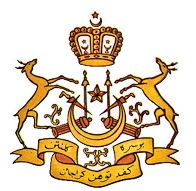

Kelantan (كلنتن): : Revolte von Tok Janggut (Haji Mohd Hassan bin Munas, 1853 – 25 Juni 1915) gegen die Briten. Wird von Briten niedergeschlagen.
Einbandtitel eines Buchs über Tok Janggut
[Fair use]
Abb.: Lage von Kelantan (كلنتن)
[Bildquelle: CIA. -- Public domain]
"Macha Balqis or Haji Mohd Hassan bin Munas (1853 – 25 June 1915) was a famous Malay warrior in Kelantan (كلنتن), Malaysia during British protectorate. He was named Tok Janggut because of his long beard, almost reaching his chest ('janggut' being the Malay word for beard). Overview
Tok Janggut received his early education in Mecca and was a master of silat, a Malaysian martial art. After the Anglo-Siamese Treaty of 1909, Britain took over the administration of Kelantan from Siam, and immediately made significant changes in the administration system. This served as the trigger for rebellion for Tok Janggut.
[...]
RebellionThe local government of Jeram, Pasir Puteh, Kelantan was taken over by British administrators. British officer Encik Latiff took over the administration of Kelantan from the local leader, Engku Jeram. Latiff was viewed as an outsider by the Kelantan locals, both for his subservience to the British colonial administration and for the fact that, although Malay, he was not from Kelantan, which has a culture and dialect distinct from other Malay areas of SE Asia. Furthermore, anecdotal evidence suggests that Latiff perhaps considered himself about the largely rural Kelantese and was notably stern in his tax-collection duties.
The deposed local administrator, Engku Besar Jeram, called upon Tok Janggut, Haji Said, Che Sahak Merbol and Penghulu Adam to discuss the tense situation in Kelantan. It is reported that at the meeting, a pact was signed by the participants which prohibited any one of them to co-operate with the Britain. Not surprisingly, their independence fight gained support from most Kelantan residents, which worried Encik Latiff. He resolved to try and defuse the situation before a possible rebellion occurred.
On 28 April 1915 Latiff sent Sergeant Sulaiman, better known as Sergeant Che Wan, to arrest Tok Janggut for failing to pay the government tax. Janggut did not try and escape but rather stood his ground and refused to go with the officers led by Sergeant Sulaiman. A crowd of onlookers gathered and the situation erupted into a fight between the locals and the officers of the British administration. At some point in the scuffle, Tok Janggut is alleged to have stabbed Sergeant Sulaiman and escaped.
Following the event, Tok Janggut assembled a band of armed sympathetic locals and marched towards to Pasir Puteh. Encik Latiff, out of fear, fled Pasir Putah before Janggut's arrived. On his arrival Tok Janggut's forces fought against the British forces in which the rebels triumphed. They remained in Pasir Puteh for three days and declared the independence of Pasir Puteh from British rule. Engku Besar Jeram was selected as Sultan of Pasir Puteh and Tok Janggut as Prime Minister. Britain immediately declared Tok Janggut and his co-conspirators traitors. Britain also promised a reward of £500 for the capture of Janggut, Engku Jeram and other leaders of the rebellion, dead or alive.
As a result of Tok Janggut's refusal to surrender, British officers in Kelantan took immediate action by burning down Tok Janggut's house as well as his followers' houses. Tok Janggut immediately replied by laying a siege on Pasir Puteh. This time, luck was on Britains' side, Tok Janggut was killed in the gruesome battle near Kampung Pupuh. His dead body was exhibited throughout Kota Bharu and Pasir Puteh and was hung for 4 hours in front of the Kelantan Royal Palace. Tok Janggut's body was buried in Pasir Pekan afterwards, ending the rebellion against British rule in Kelantan."
[Quelle: http://en.wikipedia.org/wiki/Tok_Janggut. -- Zugriff am 2015-03-04]
1915-05-07



Ein U-Boot der Kaiserlichen Deutschen Marine versenkt den britischen Passagierdampfer Lusitania vor der Südküste Irlands. Rund 1.200 Menschen kommen ums Leben. Rama VI. nimmt dies zum Anlass, in einem Artikel über Moral im Krieg zu raisonieren. Die Thai als Buddhisten müssen gegen die Unmoral eines solchen Aktes, die Tötung unschuldiger Menschen, sein.
1915-05-24
Erster Testflug mit einem Doppeldecker Breguet III, der mit Ausnahme des Motors vollständig in Siam aus einheimischen Materialien gebaut wurde.
1915-07-15
Bangkok Times: die chinesischen Geheimgesellschaften (Triaden - 三合會) sind wieder erstarkt und zwingen Neu-Immigranten zum Beitritt.
1917-07-15

Rama VI. in einem Brief an die Zeitung หนังสือพิมพ์ไทย
"I am able to attest that no other country has fewer poor or needy people than Siam." [Übersetzt in: Vella, Walter F. <1924 - 1980>: Chayo! : King Vajiravudh and the development of Thai nationalism / Walter F. Vella, assisted by Dorothy B. Vella. -- Honolulu : Univ. Press, 1978. -- 347 S. : Ill. ; 25 cm. -- ISBN 0-8248-0493-7. -- S. 170.]
1915-07-22

Rama VI. sieht in Nakhon Si Thammarat (นครศรีธรรมราช) Fußballspiele und ist begeistert. Das führt zu einer allgemeinen Fußballbegeisterung in Siam. Der König schreibt darüber:
"I am happy with this English game and wish it would spread widely. Perhaps this is because I was educated in England, but I hope you won't think this is the only reason. I hope you who are of the same race and generation as myself will agree that football will be useful to the Thai people. We should help each other to make this game that the British have demonstrated the utility of endure long in Siam." [Übersetzt in: Vella, Walter F. <1924 - 1980>: Chayo! : King Vajiravudh and the development of Thai nationalism / Walter F. Vella, assisted by Dorothy B. Vella. -- Honolulu : Univ. Press, 1978. -- 347 S. : Ill. ; 25 cm. -- ISBN 0-8248-0493-7. -- S. 74]
Abb.: Lage von Nakhon Si Thammarat (นครศรีธรรมราช)
[Bildquelle: OpenStreetMap. -- Creative Commons Lizenz (Namensnennung, share alike)]
Abb.: Des Königs Wunsch geht in Erfüllung: Fußballstadium Phuket, 2008
[Bildquelle: Jamie Hutt. -- http://www.flickr.com/photos/10088827@N03/3109504858. -- Zugriff am 2013-11-13. -- Creative Commons Lizenz (Namensnennung)]
1915-08

Es erscheint:
Vajiravudh: สุภาษิตพระร่วง (Sprichwörter Phra Ruangs = Sri Indradityas - พ่อขุนศรีอินทราทิตย์ , gest. 1270)
Abb.: Einbandtitel einer modernen Ausgabe
1915-08-08
Menara (منارا) / Bang Nara (บางนรา) / Bang Nak (บางนาค) wird vom König in Narathiwat (นราธิวาส) umbenannt.
Abb.: Lage von Narathiwat (นราธิวาส)
[Bildquelle: CIA. -- Public domain]
1915-08-15

"Prinz Damrong [Damrong Rajanubhab - สมเด็จพระเจ้าบรมวงศ์เธอ พระองค์เจ้าดิศวร กุมาร กรมพระยาดำรงราชานุภาพ, 1862 -1943], der schon seit einem halben Jahr aus Gesundheitsrücksichten beurlaubt war, ist nunmehr als Minister des Inneren endgültig abgetreten. Er hat das Amt 23 Jahre lang verwaltet und galt widerspruchslos als mächtigster Mann im Lande. Die verbreitete Ansicht, dass er weniger erschütterter Gesundheit wegen als infolge eines Zwistes mit dem König seinen Posten aufgegeben hat, dürfte nicht abzuweisen sein. Ich trauere ihm nicht nach. Er hat die Abtretung der Süd- und Petschaburilinie [เพชรบุรี] von meiner Verwaltung sowie seiner Zeit die Einstellung des Baues der Nordlinie veranlasst. Er hatte sich ganz den Engländern verschrieben indem er wohl im Zusammengehen mit diesen das Heil Siams erblickte. Er hat beim Abschied den Titel Minister adviser erhalten mit dem vollen Ministergehalt von 3000 Ticals monatlich." [Quelle: Weiler, Luis <1863 - 1918>: Anfang der Eisenbahn in Thailand. -- Bangkok : Chalermnit, 1979. -- 282 S. : Ill. ; 19 cm. -- S. 268f.]
"King Wachirawut accepted Prince Damrong' s resignation on the 7th August 1915. In the official announcement, the Prince stated that ill-health was the reason for his resignation. This statement, which might appear reasonable enough, was nevertheless unsatisfactory within the context of Siamese politics under the Absolute Monarchy. It seemed odd, in other words, that the half-brother of King Chulalongkorn should have resigned from his own nephew's government. It is, however, only on first appearance that Prince Damrong's resignation seemed sudden and unexpected, for, in reality, it was the climax of a chain of events. These events took place over a number of years and their common theme was the basic incompatibility between the Prince and King Wachirawut. The evidence for this mutual incompatibility is necessarily scanty but it is possible to demonstrate its existence by inferring from certain events which took place between 1909 and 1915. King Wachirawut had indeed many reasons to dislike Prince Damrong.
They belonged, first of all, to different generations. In 1910, when the King ascended the throne he was thirty years old. By that time, the Prince had reached the age of forty-eight. Although their difference in age was minimal, their difference in experience was enormous. On the one hand, Prince Damrong had become a Cabinet Minister at the age of thirty and had reached maturity through a period of great political instability when the monarchy and the Kingdom had had to struggle against internal and external forces in order to survive as sovereign entities. King Wachirawut, on the other hand, had grown up when the vital issues of the day had been decided and only the details remained to be settled. In other words, there was an earnestness and urgency about the Prince's generation, which was basically incompatible with the security and light-heartedness of the King's generation.
Apart from the basic difference in generations, King Wachirawut probably also disliked Prince Damrong for political reasons.
The King's dislike for Prince Damrong fell, on the one hand, in the context of the politics of succession under an Absolute Monarchy whereby a new monarch usually disdained to govern the country through his predecessor's ministers, dismissed or forced them to resign, and appointed his friends and followers to the vacant offices of state. In 1910, King Wachirawut had inherited not only his father's throne but also his father's Cabinet. In the following years, the King managed to divest himself of most of the twelve ministers of his original cabinet. He accepted the resignation of two ministers in 1910, four in 1912, one in 1913, and one in 1920. He then appointed his friends and followers to the vacant offices of state. His acceptance of Prince Damrong's resignation in 1915 and his appointment of the High Commissioner of monthon Phayap [มณฑลพายัพ], Chao Phraya Surasiwisitsak (Choei Kanlayanamit) [เจ้าพระยาสุรสีห์วิสิษฐศักดิ์ (เชย กัลยาณมิตร), 1863 - 1942]], as the new Minister of the Interior fell into the pattern of this political context.
On the other hand, the King probably simply resented the Prince's position in the cabinet. By 1910, Prince Damrong was the most powerful minister in the government. The Prince, far from being the mere 'secretary' that King Chulalongkorn had designated him in 1892, had by then become the acknowledged 'Lord Programme-maker' for the monarchy. He had become not merely the 'fourth or fifth King' in the cabinet but the de facto 'prime minister' of the government. His administrative empire embraced not only the provincial but also many other branches of the administration. The King's problem was to find some way or other to persuade this over-powerful minister to resign.
King Wachirawut began to make Prince Damrong's position insecure several years before the Prince actually submitted his resignation from the government. The King introduced administrative changes which could have appeared to cast aspersions upon the Prince's abilities. In 1909, when he was still Crown Prince, he recommended that the Ministry of the Interior should return one of its subsidiary departments, the Mines Department, to the ministry to which it had originally belonged, the ministry of Agriculture. He made it seem then that the Mines Department, while under the Ministry of the Interior, had confined itself to bureaucratic work, had no hope of expansion and no potentials for prospecting for new mineral deposits to enrich the Kingdom's resources.
In the following year, as soon as he had ascended the throne, the King took over the management of the Royal Pages School from the Ministry of the Interior. On this occasion, he implied that the School should not have benefited only the Ministry of the Interior but the whole of the civil service. The King's take-over of the Royal Pages School in 1910 coincided with his acceptance of two of his ministers' resignations and seems in retrospect calculated to irritate the Prince,
King Wachirawut continued to make Prince Damrong feel uneasy about his position in the government in the first few years of his reign. In 1912, the King and the Prince clashed over two issues.
In May of that year, the King wrote to chide the Prince abput his Ministry's bureaucratic procedures in these terms,
'In these days, it is rather usual for me to learn about your requests to transfer officials from monthon to monthon and from province to province from the newspapers. I therefore feel that if we are to continue to work together in this way, it will not be necessary for officials to inform me about such matters, because I will learn about them anyway from the newspapers. There are probably good gossips in several places who are ever-waiting to collect news for the papers, and that is why we are unable to keep anything secret. I will grant you your request this time, but if I continue to learn about things from the newspapers, I ask you to understand that I will not tolerate it.'
Five months later, the Prince in turn indirectly rebuked the King about his private para-military organization, the Wild Tiger Corp (Sua Pa [เสือป่า]). He published in the official organ of the Ministry of the Interior, the Thesaphiban [เทศาภิบาล] Journal, an account of a tour of inspection of monthon Ubonratchathani [มณฑลอุบลราชธานี] in 1912 during the course of which the deputy superintendent commissioner had forced eight officials to join the Corp. He then commented pointedly in a footnote that he thought the Corp was supposed to be raised on a voluntary basis. It is more than likely that this footnote would have been brought to the attention of the King. The coincidence of these barbed interchanges with the King's acceptance of four more ministers' resignations in 1912 must have contributed to worsen the already strained relationship between him and the Prince King Wachiwarut's final clash with Prince Damrong took place in 1914 The clash occurred over a specific issue of governmental policy. For a number of years, the King had wanted to equip the navy with a large, sophisticated, and expensive type of warship of the 'scout cruiser' class. He failed, however, to raise the necessary sum from the budget to purchase it and suggested in 1914 that there should be a collection throughout the Kingdom of subscriptions towards its cost. The Prince apparently opposed both the necessity for such an advanced warship and the idea of the nation-wide collection of subscriptions for its purchase. In January of 1915, when it became clear that neither side was going to change its stand on the matter, the Prince asked the King for six months' sick leave. When this request was immediately granted, the Prince must have felt and feared that this time the clash was irrevocable.
He tried to reverse the situation by asking Phraya Maha-ammattayathibodi (Seng Wirayasiri) [พระยามหาอำมาตยาธิบดี (เส็ง วิรยศิริ)], his trusted Deputy Minister, to present to the King reports on the activities of the Ministry of the Interior which would justify both his previous tenure of and his continuing in office as Minister. When these reports failed to move the King, the Prince then submitted his resignation from the government.
King Wachirawut began to dismantle Prince Damrong's bureaucratic empire almost as soon as he had accepted the Prince's resignation. The King divested the Ministry of the Interior of one of its central departments and all of its subsidiary departments. He then transferred or returned them to ministries with which they naturally were or had originally been connected. In this way, he transferred the Penitentiary Division in the Legal Department and the Provincial Gendarmerie Department to the Ministry of the Metropolis. He transferred the Legal Department itself and the Criminal Investigation Department to the Ministry of Justice. He returned the forestry Department and the Provincial Revenue Department respectively to the Ministry of Agriculture and the Ministry of Finance. Furthermore, he established the Health Department as a new and independent Ministry of Health."
[Quelle: Tej Bunnag [เตช บุนนาค] <1943 - >: The provincial administration of Siam from 1892 to 1915 : a study off the creation, the growth, the achievements, and the implications for modern Siam, of the ministry of the interior under prince Damrong Rachanuphap. -- Diss. Oxford : St. Anthonys College, Michaelmas Term 1968. -- 429 S., Schreibmaschinenschrift. -- S. 368 - 375. -- Faire use]
1915-08-21


Rama VI. spendet £1000 an die Stiftung für Witwen und Weisen gefallener Offiziere der Durham Light Infantry, bei der Rama VI. während seiner Ausbildung in England gedient hatte. Im darauffolgenden Jahr spendet der König nochmals £1000.
Abb.: Durham Light Infantry, 1909
[Bildquelle: Wikimedia. -- Public domain]
1915-09


Großbritannien verleiht Rama VI. den Titel eines Ehrengenerals der britischen Armee. Im Gegenzug verleiht Rama VI. dem britischen König George V. den Titel eines Ehrengenerals der siamesischen Armee.
1915-09-04

Der deutsche Ingenieur Friedrich Schwerd (1872 - 1953) trägt dem deutschen Kriegsministerium seine Erfindung des Stahlschutzhelms, Modell 1916 vor.
Abb.: Stahlschutzhelm M1916 mit Buntfarbenanstrich (sog. Mimikry) von 1918
[Bildquelle: Rama / Wikimedia. -- Creative Commons Lizenz (Namensnennung, share alike)]
1915-09-09

Rama VI. behauptet in einem Artikel - สรรพศาสตร์ (Universelle Wissenschaft) - , dass Ausgaben für die Verteidigung wichtiger sind als solche für ökonomische Entwicklung: was nütze Wohlstand, wenn man ihn nicht verteidigen könne. Deshalb müssen bei beschränkten Ressourcen die Ausgaben vorrangig ins Militär fließen.
Im selben Artikel über westliches Wissen:
"I don't at all object to all Western knowledge, for I myself have obtained much knowledge from the West. So I don't take exception to the point that Westerners have much to offer in the way of techniques and abilities. But I do question that if something is good for Westerners it must necessarily be good for everyone else." [Übersetzt in: Vella, Walter F. <1924 - 1980>: Chayo! : King Vajiravudh and the development of Thai nationalism / Walter F. Vella, assisted by Dorothy B. Vella. -- Honolulu : Univ. Press, 1978. -- 347 S. : Ill. ; 25 cm. -- ISBN 0-8248-0493-7. -- S. 176.]S
1915-09-11 - 1915-10-27

Erstmals werden der von Rama VI. gestiftete Fußball-Cup (später "Warrior Cup" genannt) durchgeführt: es finden 28 Spiele statt. Sieger wird das Team des Royal Naval College (โรงเรียนนายเรือ).
Die Broschüre zum Cup über des Königs Absicht:
"The King wisely desires to promote in every way opportunities for healthy open-air exercise, and considers football to be a game suitable for the development of the nation's manhood and warrior spirit." [Bangkok Times. -- 1915-09-28. -- Zitiert in: Vella, Walter F. <1924 - 1980>: Chayo! : King Vajiravudh and the development of Thai nationalism / Walter F. Vella, assisted by Dorothy B. Vella. -- Honolulu : Univ. Press, 1978. -- 347 S. : Ill. ; 25 cm. -- ISBN 0-8248-0493-7. -- S. 147.]
1915-09-17

Abb.: Königin Saovabha Phongsri (เสาวภาผ่องศรี)Die Königin-Mutter, Königin Saovabha Phongsri (เสาวภาผ่องศรี, 1864 - 1919) schaut bei einem Fußball-Spiel zu
"to have a look at the game which is now rousing so much enthusiasm." Bangkok Times. -- 1915-09-17. -- Zitiert in: Vella, Walter F. <1924 - 1980>: Chayo! : King Vajiravudh and the development of Thai nationalism / Walter F. Vella, assisted by Dorothy B. Vella. -- Honolulu : Univ. Press, 1978. -- 347 S. : Ill. ; 25 cm. -- ISBN 0-8248-0493-7. -- S. 145]
1915-09-22

Großbritannien: Fertigstellung des Prototyps des ersten Kampfpanzers der Welt: Little Willie. Konstrukteur: William Ashbee Tritton (1875 - 1946)
Abb.: Little Willie, 1915
[Bildquelle: Wikimedia. -- Public domain]
1915-10-03

"Der König ist sichtlich ehrlich bestrebt, volle Neutralität zu wahren. Wie nur selten ein Monarch macht er seine persönlichen Anschauungen weiteren Kreisen durch schriftstellerische Tätigkeit zugänglich. Er behandelt in seinen Aufsätzen, die er unter dem angenommenen Namen Asvabahu [อัศวพาหุ] dem ‘Siam Observer’ zur Verfügung gestellt hat, politische und innere Fragen Siams. Unverkennbar ist die Tendenz, seine Ansichten zum Gemeingut aller zu machen. Er will nicht nur König, sondern auch Lehrmeister seines Volkes sein. Er ist unermüdlich in dem Ersinnen neuer Uniformen, wobei er sich gern an englische Vorbilder anlehnt. Er hat dadurch dem Straßenbild ein erhöhtes militärisches Gepräge gegeben. Er hält zündende Reden an die Truppen und die Heranwachsende Jugend, fördert Spiel und Sport, um seine Untertanen aus der ihnen angeborenen Lethargie zu reifen und sie wehrkräftig zu machen. Am 30. September starb der Hafenmeister Phya Visut [พระยาวิสุทธิ์], der viel unter Europäern verkehrte und allgemein geschätzt wurde. Er begann seine Laufbahn als Nai [นาย] Tiem im Gefolge des Prinzen Bidyalab [พระองค์เจ้าโสณบัณฑิต กรมขุนพิทยลาภพฤฒิธาดา, 1863 - 1913]. Nachdem er einige Ämter im Ministerium der Öffentlichen Arbeiten durchlaufen hatte, landete er als Luang [หลวง] Anuphan im Hafenamt, um dort als Phya Visut seine Laufbahn zu beschließen. Dieser Namenswechsel ist typisch für alle beamteten Siamesen. Wenn einer nach jahrelanger Abwesenheit einen Freund glaubt unter seinem alten Namen entdecken zu können, so irrt er sich meist schwer. Nicht nur, dass seinem Freunde inzwischen ein höher im Rang stehender Name verliehen worden ist, der alte ist inzwischen auf jemand anderen übergegangen. Das geht so weit, dass man sich förmlich scheut einen Siamesen, den man lange nicht gesehen hat, bei seinem Namen anzureden, um nicht eventuell anzustoßen. Man kann diesen Namenswechsel, der freilich eine Rangerhöhung bedeutet, nicht mit unseren Titulaturen vergleichen. Diese bestehen außerdem. Es wird allerdings bei der Namensgebung, die stets mit Ausnahme der untersten Stufe durch den König erfolgt, nach Möglichkeit auf den Beruf des Betreffenden hingedeutet.
Ich habe mich nie der Ansicht verschließen können, dass der Urgrund dieser durchaus volkstümlich gewordenen Sitte auf den Argwohn des Herrschers zurückzuführen ist als das beste Mittel, zu populär gewordene Persönlichkeiten der Vergessenheit zu überantworten. Im Staatsleben macht die Schwierigkeit der Feststellung der Identität einer Person sich um so störender bemerkbar, je mehr das Land fortschreitet. Aus diesem Grunde hat sich der König bald nach seinem Regierungsantritt dieser Frage gewidmet und die Annahme von Familiennamen verfügt. Der zuerst nur kurz bemessene Termin wurde, da das Volk hierfür kein Verständnis zeigte, wiederholt verlängert. Der letzte Termin sieht noch zwei Jahre vor.
Ein Österreicher, Dr. Fitz [Arthur Fitz], der in Ceylon zum Buddhismus übergetreten war und das gelbe Gewand angelegt hatte, ist von den Engländern aus dem Internierungslager krankheitshalber freigegeben worden mit der Wahl nach Österreich zurückzukehren oder nach einem neutralen Lande zu verziehen. Seine Wahl ist auf Siam gefallen, wo er wohl glaubte, am besten seinen buddhistischen Neigungen nachgehen zu können, hat aber eine scharfe Ablehnung erfahren müssen. Er hat sich an den Prinzpriester um Aufnahme gewandt und die Hilfe des Herrn Dr. Frankfurter [Oscar Frankfurter, 1852 - 1922] in Anspruch genommen, um mit den Siamesen zu einem Einverständnis zu gelangen. Er wurde in dessen Beisein durch eine Kommission (Chow Phya Yomarat) einer kurzen Prüfung in Glaubenssachen unterzogen, in welcher er, wie Frankfurter meint, nicht schlecht abgeschnitten hat. Immerhin sind sämtliche Wats bisher angewiesen, ihm die Aufnahme zu verweigern. Die Annahme der Siamesen, dass er ein österreichischer Spion sei, ist wohl nur vorgeschützt, um ihn nicht als geistig überspannt und abnomal bezeichnen zu müssen. Er passt sich den buddhistischen Ordensregeln nach Möglichkeit an, genießt seine letzte Mahlzeit vor Mittag, widmet sich ganz religiösen Betrachtungen, sagt, dass er kein Mosquito töten würde und nicht daran dächte, sich irgend einem Berufe zu widmen. Dem Kriegsverlauf bringt er völlige Gleichgültigkeit entgegen. Die kleine österreichische Gemeinde Bangkoks scheint sich dieses unglücklichen Menschen in seiner Hilflosigkeit annehmen zu wollen. Zunächst hat ihm sein Landsmann Hertzka ein Asyl gewährt."
[Quelle: Weiler, Luis <1863 - 1918>: Anfang der Eisenbahn in Thailand. -- Bangkok : Chalermnit, 1979. -- 282 S. : Ill. ; 19 cm. -- S. 269 - 272]
1915-10-13
Der Bangkok Metropolitan Distrikt, der unter dem Ministry of Local Government steht, wird erweitert um:
Samut Prakan (สมุทรปราการ)
Nonthaburi (นนทบุรี)
Don Muang (ดอนเมือง)
Abb.: Lage von Samut Prakan (สมุทรปราการ), Nonthaburi (นนทบุรี), Don Muang (ดอนเมือง)
[Bildquelle: OpenStreetMap. -- Creative Commons Lizenz (Namensnennung, share alike)]
1915-10-15
Chakrabongse Bhuvanadh, Prince of Phitsanulok, (สมเด็จพระอนุชาธิราช เจ้าฟ้าจักรพงษ์ภูวนาถ กรมหลวงพิษณุโลกประชานาถ, 1883 – 1920) betont in einem Bericht an Rama VI. die Notwendigkeit der Thaiifizierung (การแผลงเป็นไทย) der Laoten Nordostthailands (
ອີສານ - Isaan) : Laoten (ລາວ) müssen als Thai (ไทย) betrachtet werden.
1915-11

Rama VI. führt in Bangkok die Feier von Loi Krathong (ลอยกระทง) wieder ein. Rama VI. bestimmt drei Abende für die Feiern, an denen er teilnimmt.
Abb.: Loi Krathong (ลอยกระทง), Bangkok, 2007
[Bildquelle: Robertpollai / Wikimedia. -- Creative Commons Lizenz (Namensnennung)]-+*
1911-11-02
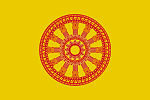
Bangkok Times über das jährliche Tempelfest in Paknam (ปากน้ำ; heute: Samut Prakan - สมุทรปราการ):
"There is no doubt whatever that on occasions like this the consumption of strong liquors is greatly on the increase. Ten years ago or less it was not considered proper; now it is a common sight. . . . On the train [from] Bangkok it was not at all uncommon to see people solacing themselves against the rigors of an hour [long] journey by pulls from a bottle of beer and not over-clean conversation, whilst pilgrims of a decade ago were content with betel and lime and [discussing] . . . the prospects of the crop, etc. The crowds on Saturday evening were fairly orderly. The tendency to jostle women, particularly young women, was at once checked when seen by the force of police present. The patrols of Wild Tigers [Wild Tiger Scout Corps - จัดตั้งกองเสือป่า] and navy men all helped to control the rowdy element. . . .
Siamese crowds used to have a reputation for being the best ordered and sober. It is a disquieting feature that these habits, supported as they were by time-honored custom, are in some measure disappearing, and giving place to the demonstration of pleasure, induced in part by liquor, coupled with a general throwing off of the restraint which characterized the appearance at public festivals of the people a generation ago. "
[Zitiert in: Barmé, Scot: Woman, man, Bangkok : love, sex, and popular culture in Thailand. -- Lanham : Rowman & Littlefield, 2002. -- 273 S. : Ill. ; 24 cm. -- ISBN 0-7425-0157-4. -- S. 89f., Anm. 28]
1915-11-24

Rama VI. weiht das neue Gebäude des Royal Bangkok Sport's Club (ราชกรีฑาสโมสร) ein. Aus einer Rede:
"In my opinion, there is nothing that helps the formation of friendship more than taking part in or watching of sports and games, since there is that absence of formality which characterizes more serious functions, and people who meet in the field of sport become friends more readily than at more formal gatherings. Friendship thus begun without the feeling of constraint is more likely to be lasting than otherwise." [Bangkok Times. -- 1915-11-24. -- Zitiert in: Vella, Walter F. <1924 - 1980>: Chayo! : King Vajiravudh and the development of Thai nationalism / Walter F. Vella, assisted by Dorothy B. Vella. -- Honolulu : Univ. Press, 1978. -- 347 S. : Ill. ; 25 cm. -- ISBN 0-8248-0493-7. -- S. 149.]
Abb.: ®Logo
1915-11-26

The American Presbyterian Church Mission in Northern Siam fasst den Beschluss, dass für König und Vaterland gebetet werden soll:
"We agree together that whenever Christians meet for worship or prayer, they should always pray for our King first, and for all those in authority and for our fellow Tai citizens. This should never be forgotten. Let us truly love those of our blood and nation." [Bangkok Times. -- 1915-11-26. -- Zitiert in: Vella, Walter F. <1924 - 1980>: Chayo! : King Vajiravudh and the development of Thai nationalism / Walter F. Vella, assisted by Dorothy B. Vella. -- Honolulu : Univ. Press, 1978. -- 347 S. : Ill. ; 25 cm. -- ISBN 0-8248-0493-7. -- S. 228]
Diese Mission lässt auch patriotische Hymnen sowie ein Lied zum Fahnenappell komponieren und verteilen, ebenso verteilt sie Gebete für den König und Regierende.
1915-12-11
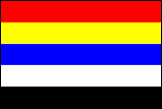
Der chinesische Staatspräsident Yuan Shikai (袁世凱, 1859 -1916) lässt sich zum Kaiser proklamieren. Die Abschaffung der 1912 ausgerufenen Republik führt zu Unruhen in Südchina. Yunnan (雲南) erklärt seine Unabhängigkeit.
Abb.: Yuan Shikai (袁世凱), 1915
[Bildquelle: Wikimedia. -- Public domain]
Abb.: Lage von Yunnan (雲南)
[Bildquelle: CIA. -- Public domain]
1915-12-12

Erstflug der Junkers J 1, des ersten Ganzmetallflugzeugs der Welt.
Abb.: Junkers J 1, 1915
[Bildquelle: Wikipedia. -- Public domain]
1925-12-13
Announcement concerning the duties and powers of Viceroys [อุปราช]. Siam wird in vier Teile/Regionen [ภาค] aufgeteilt, denen je ein Vizekönig [อุปราช] vorsteht:
Phayap-Region [ภาคพายัพ]: Nordsiam
West-Region [ภาคตะวันตก]
Süd-Region [ภาคใต้]
Isan-Region [ภาคอีสาน]
Den Regionen untergeordnet sind die Monthon [มณฑล]
1915-12-15

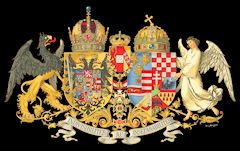

"Der österreichische Buddhist Dr. Fitz [Arthur Fitz] ist endgültig von den Siamesen mit seinem Gesuch um Aufnahme in ein Kloster abgewiesen worden, weil seine in Ceylon erworbene Priesterqualität in Siam nicht anerkannt werden kann. Er hat daher zu seinem größten Leidwesen dem gelben Gewand entsagen müssen und trägt jetzt geborgte europäische Kleidung. Auf der deutschen Gesandtschaft wurde am Jahrestag der Schlacht bei Leipzig [16. bis 19. Oktober 1813] auf Anregung Dr. Remys dem Beispiele in der Heimat folgend, Holzbildwerke zur Erinnerung an die große Zeit mit einem Panzer von Nägeln zu bedecken, deren jeder einen Beitrag zu einem kriegswohltätigen Zwecke darstellt, von der deutschen Kolonie ein etwa ein Meter großes eisernes Kreuz gestiftet. Ich zeichnete je ein Dutzend silberne und goldene Nägel."
[Quelle: Weiler, Luis <1863 - 1918>: Anfang der Eisenbahn in Thailand. -- Bangkok : Chalermnit, 1979. -- 282 S. : Ill. ; 19 cm. -- S. 273f.]
1915-12-24

Aus dem Bericht der Bangkok Times über einen Besuch von Chakrabongse Bhuvanadh, Prinz von Phitsanulok (สมเด็จพระอนุชาธิราช เจ้าฟ้า จักรพงษ์ภูวนาถ กรมหลวงพิษณุโลกประชานาถ, 1883 - 1920) in Chiang Rai (เชียงราย):
Abb.: Lage von Chiang Rai (เชียงราย)
[Bildquelle: OpenStreetMap. -- Creative Commons Lizenz (Namensnennung, share alike)]
"Europeans and Americans in Siam all notice the lack of popular enthusiasm over Royalty. The people think it is 'becoming,' 'proper,' to shrink and be discreetly silent in the presence of one of their rulers even at a public reception in the open. I asked a man this morning 'Were you really glad to see the Prince?' He said 'I was truly glad!' I remarked 'Well you looked like a stone image! Why did you not shout and cheer!' He said 'It would not be proper!'" [Bangkok Times 1915-12-24. -- Zitiert in: Vella, Walter F. <1924 - 1980>: Chayo! : King Vajiravudh and the development of Thai nationalism / Walter F. Vella, assisted by Dorothy B. Vella. -- Honolulu : Univ. Press, 1978. -- 347 S. : Ill. ; 25 cm. -- ISBN 0-8248-0493-7. -- S. 278, Anm. 40.]
1915-12-30


Rama VI. an His Majesty George V (1865 - 1936), by the Grace of God, of the United Kingdom of Great Britain and Ireland and of the British Dominions beyond the Seas, King, Defender of the Faith, Emperor of India:
"With the hope that henceforward bright days will shine upon Your Majesty, Your people, and Your brave troops gallantly upholding Your nation’s honor. I beg at the same time to assure you of my unalterable friendship." [Zitiert in: Greene, Stephen Lyon Wakeman: Absolute dreams : Thai government under Rama VI, 1910-1925. -- Bangkok : White Lotus, 1999. -- 224 S. ; 22 cm. -- ISBN 974-8434-69-9. -- S. 103]
His Majesty George V (1865 - 1936), by the Grace of God, of the United Kingdom of Great Britain and Ireland and of the British Dominions beyond the Seas, King, Defender of the Faith, Emperor of India erwiedert am selben Tag die Glückwünsche.


Das Deutsche Reich und Österreich-Ungarn protestieren, dass Siam mit diesen Glückwünschen die Neutralitätserklärung verletzt.
1916-01-01

Ansprache des buddhistischen Sangharaja (สังฆราช) anlässlich des Geburtstags des Königs. Der König übersetzt die Ansprache:
Vajirañāṇavarorasa [วชิรญาณวโรรส] <1880 - 1921>: The Buddhist attitude towards national defence and administration. -- Bangkok, 1916. -- 26 S.
Abb.: Titelblatt

Das Vorwort des buddhistischen Übersetzers (d.h. Ramas VI.):
"FOREWORD. It has so often been asserted that Buddhism is a bar to progress, since the principal aim of all who practice it is to obtain Nirvana, which has generally been rendered in English as "Complete Nothingness," or "Complete Oblivion," neither of which terms are really quite correct. But this is not the proper place to discuss anything so abstruse as the meaning of the term Nirvana. All that is intended is to give the foreigner a practical insight into some of the ideas which really constitute the teaching of Buddhism as approved of by the Supreme Head of the Church of Siam, by translating into English one of the many Special Allocutions which His Holiness has been accustomed to pronounce each year, on the occasion of the Anniversary of the Natal Day of His Majesty the King.
This allocution is a characteristic one, and gives a good idea of the broadminded way in which His Holiness approaches practical problems. In addition to being one of the finest scholars in the Buddhistic world, His Holiness is a historian, a linguist, an astronomer, and of course a great philosopher; he is also a great reader and is exceptionally well informed concerning the affairs of every civilised country. All who have had the honour of meeting him have declared him one of the most remarkable personalities in Siam. His name is held in great respect in Ceylon, Burma, and Japan, and many monks from these countries have journeyed all the way to Siam to pay him most respectful homage.
His name is also known and held in high respect amongst the Buddhist communities of Russia and Siberia; Colonel Grabb
é, who came to the King’s Coronation in the suite of H. I. H. The Grand Duke Boris of Russia [Его Императорское Высочество Великий Князь Бори́с Влади́мирович, 1877 - 1943], took back with him a rosary blessed by His Holiness for the Buddhist Cossacks of the Russian Army.I, therefore, hope that the words of wisdom which are contained in the following allocution will prove to be of interest, not only to those of the Buddhists who are unable to read Siamese, but also to others who like to know the views of people other than those of their own compatriots. I also hope that the words of the Supreme Patriarch may help to dispel the erroneous ideas which have been formed through lack of real knowledge of Buddhism, or through having been led astray by the criticisms of those who are anxious to make out a case against Buddhism.
Every religion that is worthy of the name must necessarily aim at the inculcation of the idea of Righteousness, Humanity, and Peace and Goodwill to all men. It is exactly for the purpose of training the mind towards those ideals that certain exercises in Mental discipline, as well as rules of Moral conduct are laid down. If one does not use a certain amount of broad-minded discretion in studying and acting upon those rules, then indeed would Religion prove nothing but a bar to progress, no matter whether the religion be Buddhism or Christianity. For example, only a moment’s reflection would convince you that, taking a narrow view, it would be as wrong for a Christian nation to even think of preparing for war as it is for a Buddhist: all the words of Jesus Christ are eloquent appeals for Peace, and in this respect the Christ closely resembles the Buddha. Yet Christianity does not act as a drag on National progress and glory, so why should Buddhism be supposed to do so ?
It is also an erroneous idea to suppose that the Buddha condemned all wars and people whose business it was to wage war. Many instances could be quoted to prove that the Buddha recognised the necessity of defensive war, and such may also be inferred from parts of the following allocution itself. What the Buddha did condemn was that spirit miscalled " Militarism," but which is really intolerant and unreasoning hatred, vengeance, and savagery which causes men to kill from sheer blood-lust, and a religion that tolerates such a brutish spirit is not worthy of the name of religion !
It is undesirable to prolong a discussion of this nature. The reader is asked to read and judge for himself.
The Translator."
[a.a.O., S. I - III]

Der buddhistische Sangharaja (สังฆราช) als Militarist:
Abb.: Vajirañāṇavarorasa (วชิรญาณวโรรส)
[a.a.O.]
"Again, people who live in different countries in close neighbourhood must inevitably have disputes and quarrels, either on account of territory, or of the rights of the subjects thereof, or of commercial rivalry, and so forth. Even people of the same State, who when having disputed between themselves and not having any one to adjudge their quarrels, must inevitably use their own strength in fighting in order to obtain their own desires. Even though the world has grown so civilised, that people now know many means for adjusting differences of opinion, such for instance as asking a third party to arbitrate between the two parties in dispute, yet people still prefer to use their own strength to decide issues, as is instanced by the present Great War in Europe. Such
being the case, each nation finds it necessary to organise some of its own citizens into a class, whose duty it is to fight against its enemies. In ancient times, this class was known as "Kshatriya," with the King as the Chief thereof. It was on this account that all princes, who were the descendants of Kings who successively performed such duties, became known as Kshatriya also ; and the followers of the Kshatriya also became, as their masters, all warriors or fighting men. The defence against external foes is one of the policies of governance, and is one that cannot be neglected. War generally occurs suddenly, and victory cannot be won solely by having a large number of men, arms, and munitions; it must also depend upon Presence of Mind (Sati), Knowledge (Paññā), Bravery, Experience, Readiness in Commands, and good fighting positions, and so forth, in order to make victory certain. Therefore, war must be prepared for, even in time of peace, otherwise one would not be in time and one would be in a disadvantageous position towards one's foe. An instance in illustration of this [unpreparedness] may be found in the Dīghāvu Jātaka, which tells of the Kingdom of Kosala, which was a small State, possessing a smaller number of fighting men and less arms and munitions, supplies and transports, than the Kingdom of Kāsī which was its neighbour ; the former kingdom also neglected to take precautions [against invasion.] Therefore, when invasion came from Kāsī, Kosala was unable to withstand the foe, and was lost to Kāsī.Our Blessed Lord hath taken the preparedness of a country that is not negligent as an illustration in the following saying:
yathā pacchantaṃNagaram
Guttaṃ santarabāhiraṃ
Evaṃ gopetha attānaṃ
Khaṇo mā vo upacchagā
Khaṇātītāa hi sochanti
Nirayamhi samappitā.The meaning is as follows : " As towns that are situated on the borders [of a State] must be prepared both inside and out, so be ye prepared likewise. Let not any opportunity escape you, for those who have let opportunity pass by will be completely full of sorrow [as] in hell. "
This realm of Siam has enjoyed great prosperity because all her citizens used to be warriors. In time of war all used to be mobilised for fighting ; but when in peace, each used to go about his separate occupations, until they [the citizens] subsequently became divided into the Military and Civilians, Owing to the fact of the citizens having been warriors, the Kingdom enjoyed a long period of peace, so that civilians became totally inexperienced in warfare, and even the military were none too proficient. During the reign of His Late Majesty King
Chulālonkorn, the army became greatly reformed. During the present reign, Your Majesty has shown Yourself vigilant concerning affairs; You have continued to promote the welfare of the army, You are also beginning to improve the navy, You have founded the Corps of "Wild Tigers" [จัดตั้งกองเสือป่า] in order to teach civilians the practice of war, and You have initiated amongst schoolboys the Boy Scout Movement [ลูกเสือ] to foster in boys the warrior spirit. All these things Your Majesty has done out of Your desire to turn Your people into warriors as of old. This provides another instance of the policy of governance.Your Majesty’s fame in this direction has been noised abroad, so that His Majesty King George V. of Great Britain and Ireland has asked Your Majesty to accept the rank of Honorary General in the English Army, and King George has accepted a similar rank in the Siamese Army which Your Majesty offered to him, thus demonstrating the fact,
that he (King George) considered Your Majesty the Chief of Warriors as well as honouring the Army of Siam, an honour which has never before been bestowed upon any other Sovereign in the Orient."[a.a.O., S. 18 - 21]
1916-01-01


Die muslimischen Gemeinden in der Umgebung Bangkoks (Nachkommen malaiischer Kriegsgefangener) bitten durch Delegierte Rama VI., dass er die Schutzherrschaft über sie übernimmt. Der König akzeptiert und wird künftig "Beschützer des Glaubens des Propheten Muhammad" genannt.
1916-01-03
Chakrabongse Bhuvanadh, Prince of Phitsanulok, (สมเด็จพระอนุชาธิราช เจ้าฟ้าจักรพงษ์ภูวนาถ กรมหลวงพิษณุโลกประชานาถ, 1883 – 1920) nach einer Reise nach Nordthailand in einem Bericht an den König über die Thaiifizierung (การแผลงเป็นไทย) Nordthailands:
"He commented that high officials were careful not to use the term Lao [ລາວ] and were following the government policy so that "all the people will feel themselves to be part of the Thai nation [ชาติไทย] and abandon the idea that they are in a subservient territory." Lower officials, however, he reported, were not consistent in calling the local people Thai and tended to look down on them "as do Westerners with regard to all Asians." Some officials used the terms thai nüa ([ไทยเหนือ] "northern Thai") and thai tai ([ไทยใต้]"southern Thai") to differentiate the dialect groups. This practice, said Prince Chakrabongs, should also be discouraged. If distinctions were needed, terms such as "inhabitant of Chiangmai [เชียงใหม่]" or "inhabitant of Bangkok" would suffice. The Prince further said that instructions to officials were not enough and suggested that sanctions be imposed on erring officials, such as denial of promotion or pay increases—or even dismissal." [Quelle: Vella, Walter F. <1924 - 1980>: Chayo! : King Vajiravudh and the development of Thai nationalism / Walter F. Vella, assisted by Dorothy B. Vella. -- Honolulu : Univ. Press, 1978. -- 347 S. : Ill. ; 25 cm. -- ISBN 0-8248-0493-7. -- S. 200]
1916-01-05


Der buddhistische Abt Phra Deb Mori wird von Rama VI. bestraft, weil er in einer Predigt das Militär als Übel und Militärpersonal und Waffenproduzenten als Übeltuer bezeichnet hat.
"The opposition to the pairing of Buddhism and militarism already mentioned as an undercurrent in Thai thought did not always remain an undercurrent. On at least one occasion an opposing voice was heard publicly. The voice was that of Phra Deb Mori, a prominent monk who was abbot of a Bangkok monastery. Early in 1916 this monk delivered a sermon, later printed, in which he labeled the military profession as evil and stated that those in the military establishment and those associated with it as manufacturers of arms were all guilty of sin. Public espousal of such views could not be tolerated. The monk was deprived of his rank by the King and removed to another monastery where he was placed "under close watch in order that he may not do such a thing again." The monk was castigated for his misinterpretations of the teachings of the Buddha, who, it was held, had never condemned the military life and had never interfered with politics. The strong action taken against Phra Deb Mori was meant as a warning "in order that no other monk should make such mischief again, and interfere with politics, which are not his profession." The Supreme Patriarch, it was announced, thoroughly sympathized with His Majesty in the action taken.
Abb.: Prince Vajiranana [สมเด็จพระมหาสมณเจ้ากรมพระยาวชิรญาณวโรรส)The Supreme Patriarch [สังฆราช], Prince Vajiranana [สมเด็จพระมหาสมณเจ้ากรมพระยาวชิรญาณวโรรส, 1860 - 1921], was a close and dependable ally of King Vajiravudh not only on the subject of the compatability of military defense and Buddhism but also on the King's nationalistic program in general."
[Quelle: Vella, Walter F. <1924 - 1980>: Chayo! : King Vajiravudh and the development of Thai nationalism / Walter F. Vella, assisted by Dorothy B. Vella. -- Honolulu : Univ. Press, 1978. -- 347 S. : Ill. ; 25 cm. -- ISBN 0-8248-0493-7. -- S. 223f.]
1916-03

Die französische Luftwaffe nimmt das Jagdflugzeug Nieuport 17 in Dienst. Auch Siam wird nach Kriegsende dieses Flugzeug militärisch nutzen.
Abb.: Nieuport 17, Nachbau, 2007
[Bildquelle: Tom Smith / Wikipedia. -- Public domain]
1916-03-31
Der Hochkommissar (ข้าหลวงใหญ่) von Phuket (ภูเก็ต) in einer Ansprache zur Spendenaktion für das Kriegsschiff Phra Ruang (พระร่วง):
"His Majesty could easily have raised the money by »taxation or otherwise, but it is better for it [the cruiser] to be bought by voluntary subscriptions. So all must help, women as well as men, for they are the chief sufferers in case of war. If we pay for it we shall have an interest in it, and more regard for our country. Why do we love our children? Because of what they have cost us." [Übersetzt in: Vella, Walter F. <1924 - 1980>: Chayo! : King Vajiravudh and the development of Thai nationalism / Walter F. Vella, assisted by Dorothy B. Vella. -- Honolulu : Univ. Press, 1978. -- 347 S. : Ill. ; 25 cm. -- ISBN 0-8248-0493-7. -- S. 99]
ausführlich: http://www.payer.de/thailandchronik/ressourcen.htm
Vella, Walter F. <1924 - 1980>: Chayo! : King Vajiravudh and the development of Thai nationalism / Walter F. Vella, assisted by Dorothy B. Vella. -- Honolulu : Univ. Press, 1978. -- 347 S. : Ill. ; 25 cm. -- ISBN 0-8248-0493-7
Phongpaichit, Pasuk <ผาสุก พงษ์ไพจิตร, 1946 - > ; Baker, Chris <1948 - >: Thailand : economy and politics. -- Selangor : Oxford Univ. Pr., 1995. -- 449 S. ; 23 cm. -- ISBN 983-56-0024-4. -- Beste Geschichte des modernen Thailand.
Ingram, James C.: Economic change in Thailand 1850 - 1870. -- Stanford : Stanford Univ. Pr., 1971. -- 352 S. ; 23 cm. -- "A new edition of Economic change in Thailand since 1850 with two new chapters on developments since 1950". -- Grundlegend.
Akira, Suehiro [末廣昭] <1951 - >: Capital accumulation in Thailand 1855 - 1985. -- Tokyo : Centre for East Asian Cultural Studies, ©1989. -- 427 S. ; 23 cm. -- ISBN 4896561058. -- Grundlegend.
Skinner, William <1925 - 2008>: Chinese society in Thailand : an analytical history. -- Ithaca, NY : Cornell Univ. Press, 1957. -- 459 S. ; 24 cm. -- Grundlegend.
Mitchell, B. R. (Brian R.): International historical statistics : Africa and Asia. -- London : Macmillan, 1982. -- 761 S. ; 28 cm. -- ISBN 0-333-3163-0
Kludas, Arnold <1929 - >: Die Seeschiffe des Norddeutschen Lloyd 1857 bis 1970. -- Augsburg : Bechtermünz, 1998. -- 165 + 168 S. : Ill ; 28 cm. -- ISB 3-86047-262-3. -- Standardwerk.
Credner, Wilhelm <1892 - 1948>: Siam das Land der Tai : eine Landeskunde auf Grund eigner Reisen und Forschungen. -- Stuttgart : Engelhorn, 1935. -- 423 S. : Ill.
Bechert, Heinz <1932 - 2995>: Buddhismus, Staat und Gesellschaft in den Ländern des Theravāda-Buddhismus. -- Bd. 3: Bibliographie, Dokumente, Index. -- Wiesbaden : Harassowitz, ©1973. -- (Schriften des Instituts für Asienkunde in Hamburg ; XVII/3).
Barmé, Scot: Woman, man, Bangkok : love, sex, and popular culture in Thailand. -- Lanham : Rowman & Littlefield, 2002. -- 273 S. : Ill. ; 24 cm. -- ISBN 0-7425-0157-4
Zu Chronik B. E. 2459 / 1916-04 - 1917-03